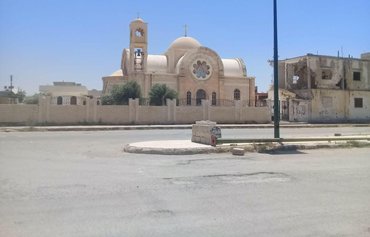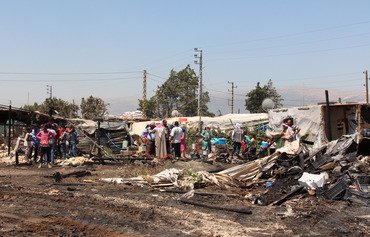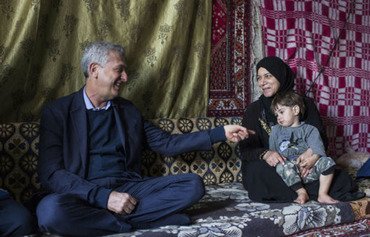After nearly four years of displacement, residents of the Bekaa Valley border town of Tufail recently made their way back home in a large convoy of trucks and cars, escorted by the Lebanese forces.
On November 30th, about 270 families returned to their town, which is home to both Lebanese and Syrian families.
Most residents of Tufail, which lies in Lebanon's eastern mountain range in an area surrounded by Syrian territory, were forced to flee when the town came under attack a few years ago.
Many have been living in refugee camps in Arsal, Baalbek and Riyaq, Lebanon's Naharnet reported.
![Residents of Tufail gather on November 30th to welcome 200 Lebanese and 60 Syrian families who had fled the town four years ago back to the area. [Photo courtesy of Alaa Othman]](/cnmi_am/images/2017/12/11/10609-tufail-celebrations-600_384.jpg)
Residents of Tufail gather on November 30th to welcome 200 Lebanese and 60 Syrian families who had fled the town four years ago back to the area. [Photo courtesy of Alaa Othman]
Their return comes after the Lebanese army liberated the area around Arsal, Ras Baalbek and al-Qaa from armed groups in August, and as Syrian refugees are starting to make their way back home to safe areas in Syria.
"We are finally back in our town, safe and sound," said Abu Musab Abdelrazzaq al-Sayyed, a Syrian who returned with his wife and five children last week.
"It is so nice to be back, even if to a destroyed home," he told Al-Mashareq, as he received congratulations on his return. "I would not trade it for a palace."
"What a great moment to be back on my land and orchards to tend to them once again," he said. "I will replant them with fruit-bearing trees so they can once again become my main source of income."
Return after forcible displacement
Dar al-Fatwa facilitated the return to Tufail, with the General Directorate of General Security processing returnees' paperwork at Ham al-Dayaa checkpoint, about 15 kilometres from the town, the National News Agency reported.
The returnees drove home along mountain roads and through rugged terrain accompanied by Lebanese army units, while a bulldozer removed sand berms blocking the path of their convoy.
A celebratory reception was held for the returnees by the 13 Lebanese and 14 Syrian families who had stayed behind in the town despite the security risks stemming from battles in nearby al-Qalamoun, the agency said.
Tufail is now "safe, secure and stable, thanks to the Lebanese army, which liberated its surrounding areas from terrorists", said the town's imam, Sheikh Ahmed Agha.
The town had been home to 4,000 Syrians and Lebanese, who lived there "as one family" but were forced by the war to move away, he told Al-Mashareq.
"Our main goal in returning is to live in our homes and earn our livelihood from our agricultural lands, which we were forced to neglect," he said.
Facilitating return of refugees
"Our joy over returning to our town after more than three and a half years is indescribable," Tufail mayor Ali al-Shoum told Al-Mashareq.
"We returned to our lands despite the fact that most of our homes were destroyed," he said.
Tufail is bordered by Syrian towns to its north, east and south. On the Lebanese side, it is close to Ham, Maarboun and Britel to its west.
The only unpaved road that leads to Tufail was rehabilitated about a month ago in a co-ordinated effort between the Ministry of Interior and Ministry of Municipalities and Public Works, al-Shoum said.
But paving it may be difficult before the spring arrives, he added.
"The closest Lebanese army position to the town is about two kilometres away in the Qabeh al-Khatm area," al-Shoum said, expressing his hope that an army position will be established inside the town.
Bekaa Centre for Documentation and Information director Mahmoud Shukr told Al-Mashareq the return of Lebanese and Syrian families to Tufail "gives impetus to the return of Syrian refugees to their villages" along the border.
Military operations have ended in villages along Lebanon's eastern mountain range and through Syria's al-Qalamoun region as far as Damascus, he said.
Since the beginning of 2017, a few thousand Syrian refugees have returned to Syria from Lebanon, UNHCR assistant public information officer Lisa Abu Khaled told Al-Mashareq.
The agency is seeking solutions to ensure a safe return for them, she said, noting that others are resettling in a third country, as with the November 23rd departure of 22 Syrian refugees from Lebanon to be resettled in France.
"Some are returning voluntarily to Syria, and international organisations are working to ensure a safe and dignified return for them," she said.

![A convoy of 270 Lebanese and Syrian families makes its way along an unpaved road towards the town of Tufail on the Syria-Lebanon border. [Photo courtesy of Alaa Othman]](/cnmi_am/images/2017/12/11/10611-Lebanon-Tufail-convoy-600_384.jpg)






